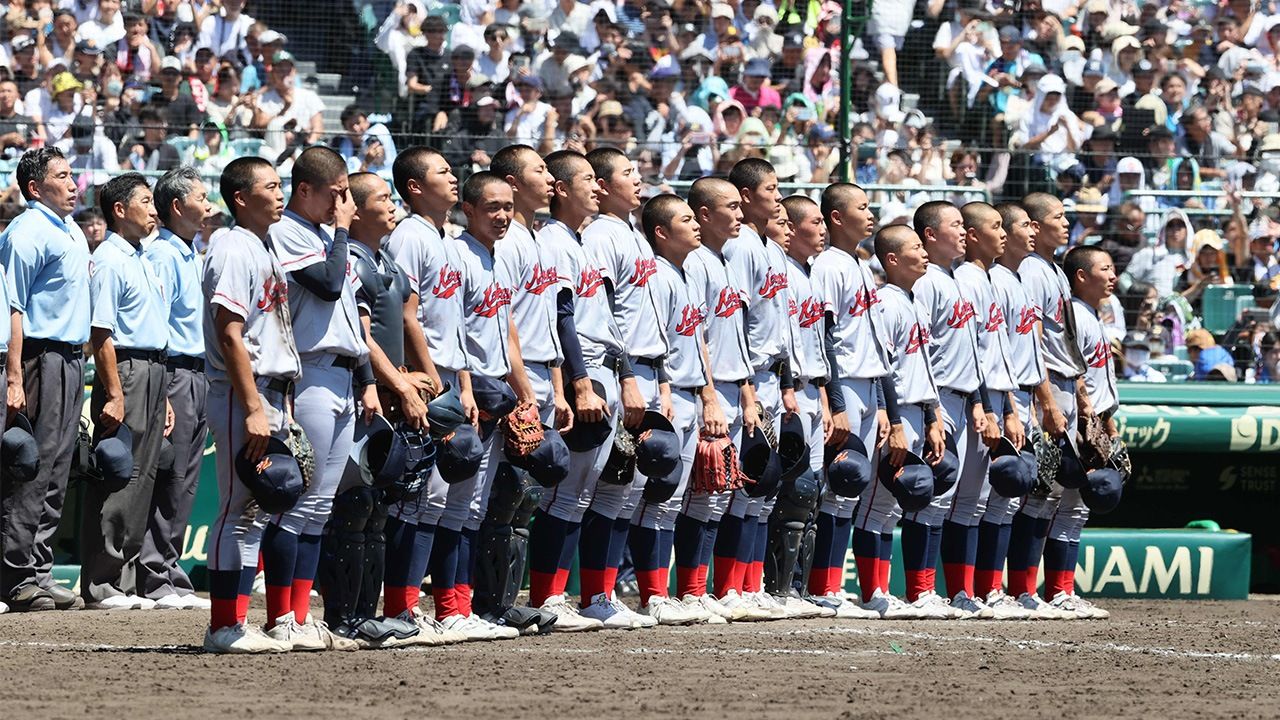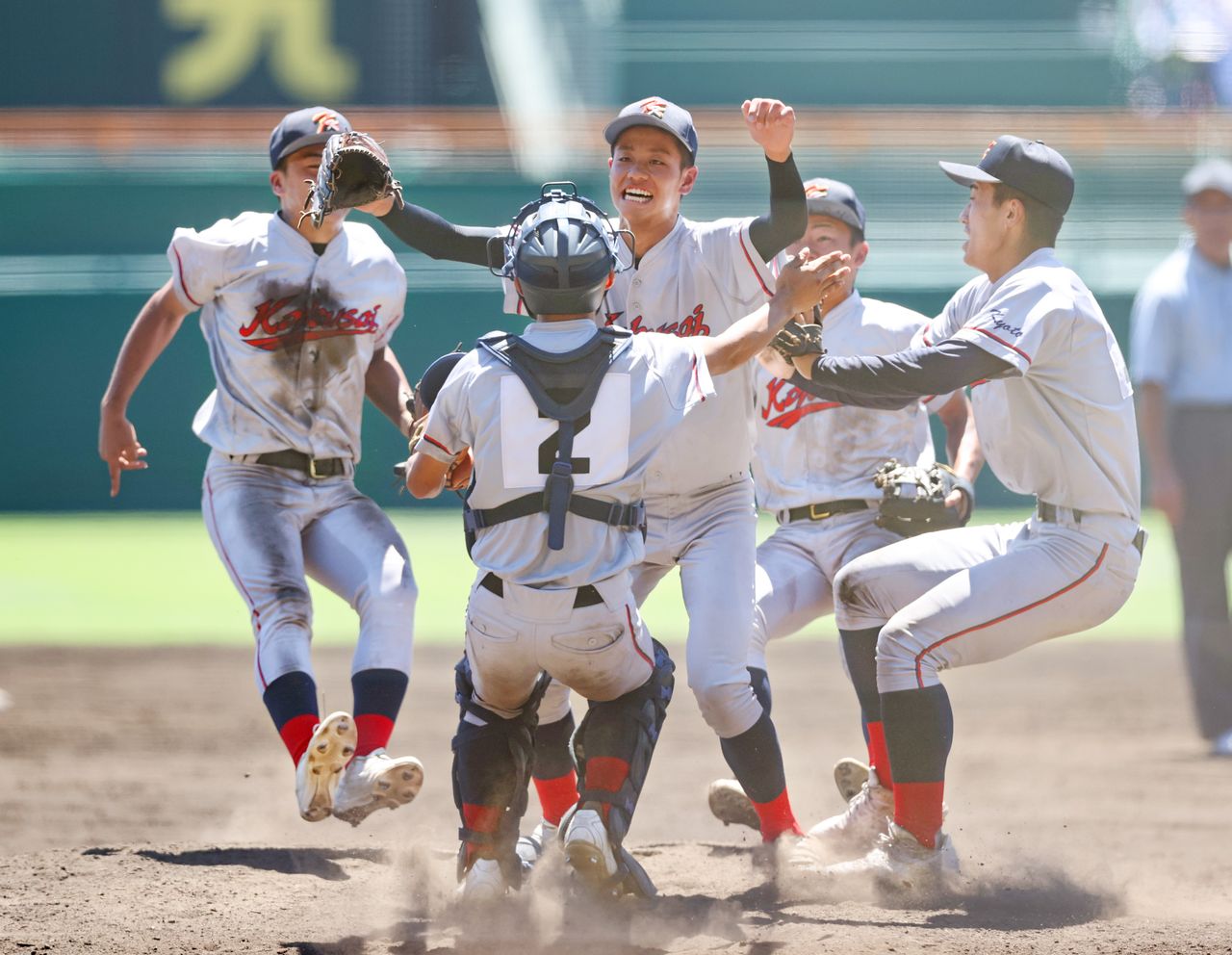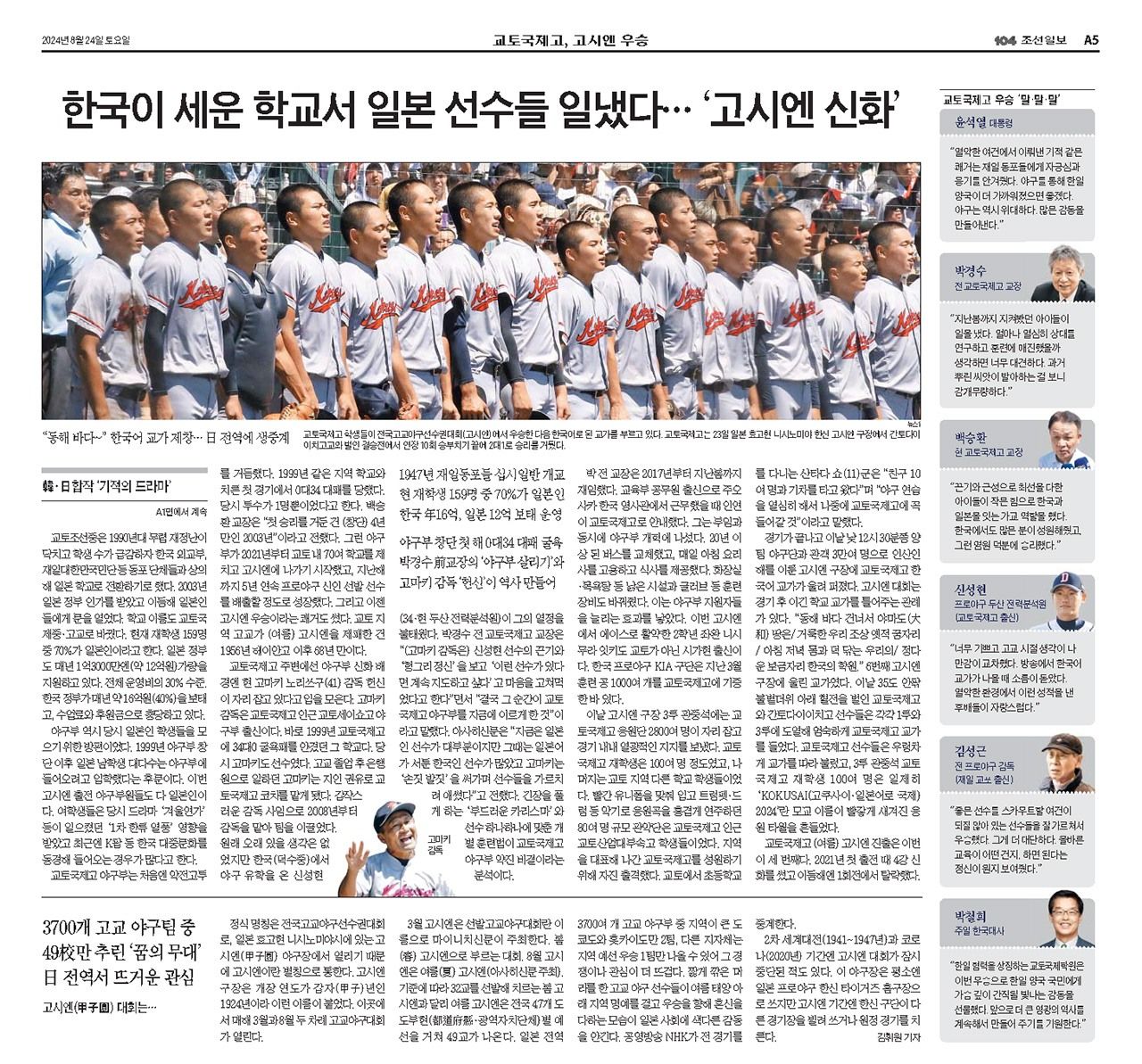
Kyoto Kokusai: A School’s Anthem Gives Food for Thought
Sports Culture- English
- 日本語
- 简体字
- 繁體字
- Français
- Español
- العربية
- Русский
The final match of the 106th national high school baseball championships took place on August 23, 2024, at Hanshin Kōshien Stadium, in the city of Nishinomiya, Hyōgo Prefecture. The 2,800 seats reserved at the third-base Alps stand for fans of Kyoto International Junior and Senior High School (also known as Kyoto Kokusai School, or KKS) were filled to capacity.
Apparently, only 1,600 seats had been allocated initially. KKS is relatively small, with only 138 students in its high school division. Event organizers believed that, no matter how many family members and alumni attended, 1,600 seats would be more than enough.
Their opponents, Tokyo’s Kantō Daiichi High School, with 2,400 students, was expected to draw a much larger crowd of fans. But in the end, the number of seats for KKS fans had to be increased, thanks to the many students of all ages who came from Kyoto in support.
An 80-member-strong brass band, clad in eye-catching red uniforms, stood at the front of the third-base bleachers. In fact, the band was not from KKS, but from its neighbor, Kyoto Sangyō University Senior High School. The band, mainly comprised of female students, played their brass instruments and beat their drums throughout the two-hour match in the scorching summer heat.
Members of the Kyoto Seishō High School baseball team were also in the stands, despite having being defeated by KKS in the first round of the Kyoto prefectural tournament. A fourth-grade elementary school student told us he came from Kyoto by rail with 10 friends. “I’m going to train my best at baseball to get into KKS.” The supporters were not only from Japan. There were also 15 members of the baseball team from Seoul’s Yangcheon Middle School.
A Presidential Decree: Baseball is Magnificent!
Supporters who filled the 2,800 seats rose above racially charged sentiment. All they wanted was to see KKS win the tournament. The game was scoreless through the first nine innings, but KKS scored two runs in the top of the tenth, with a forced walk and a sacrifice fly. Kantō Daiichi, coming from behind, came back with one run in the bottom of the tenth, but in the end, with two outs and the bases loaded, left-handed ace Nishimura Ikki struck out the final batter, clinching the title for Kyoto. KKS’s school anthem, sung in Korean, echoed throughout the stadium. It was the sixth time it had been sung at Kōshien this tournament.

KKS pitcher and Nishimura Ikki, at center, and his teammates celebrate their victory on August 23, 2024. (© Jiji)
Soon after the KKS victory hit the news, South Korean President Yoon Suk Yeol posted about the match on Facebook, commenting: “It would be good if baseball brings Korea and Japan closer together. Baseball is really magnificent!” South Korean ambassador to Japan and one of Korea’s leading experts on Japan, Park Cheol-hee, was also in the stands for the historic game.
The Korean newspaper Chosun Ilbo featured a front-page article on the “dramatic miracle” in its morning edition on August 24. I also wrote a full-page article, featured on page five, heralding the historic victory by Japanese players of the Korean-built school. The efforts of KKS can provide a clue as to what kind of neighbors Japan and Korea should be, indicated by the amount of media space dedicated to the story.

Page 5 of the August 24 Chosun Ilbo. (Courtesy Sung Ho-chul)
The School’s Korean Roots
KKS was founded in 1947 as Kyoto Chōsen Junior High School, by Zainichi, or ethnic Korean, residents. Following a drastic drop in student numbers in the 1990s due to financial troubles, South Korea’s Ministry of Foreign Affairs and Trade (predecessor of the Ministry of Foreign Affairs), Mindan (the Korean Residents Union in Japan), and other bodies agreed to transform it into a Japanese school. In 2003, it was approved as a school under Article 1 of Japan’s School Education Act. The following year, it began accepting Japanese students, and the school name was changed to Kyoto International Junior and Senior High School.
Currently, the school has 159 students in grades 7 to 12, 70% of whom are Japanese. An eleventh-grade male student at the game said, “I joined KKS after seeing them first play at Kōshien in 2021. My friends on the field, players on the bench, and those of us here in the supporter stand all fought this match together.”
The school’s win is unusual in other ways. Its baseball ground has only 70 meters to the right field wall and 60 meters to the left, preventing players from giving it their all in batting practice. The fact that a boy’s baseball team from a high school with around 70 male students could win the national tournament is astonishing.
Apparently a minority of viewers of the NHK live broadcast expressed negativity at the KKS Korean-language anthem being played. There were Japanese-language posts on X (formerly known as Twitter) calling for the expulsion of KKS from the Japan High School Baseball Federation, and expressing discomfort at the Korean-language school anthem. In response, the governor of Kyoto Prefecture, Nishiwaki Takatoshi, announced at a press conference on August 23 that he had submitted a request to the social media operator to delete four discriminatory posts.
There was also controversy on the Korean side. The KKS school anthem starts with a reference to crossing the “East Sea,” the Korean name for what is widely known as the “Sea of Japan.” There were many posts critical of NHK for its Japanese subtitling of the anthem lyrics, watering down the reference to something akin to “the sea to the east.”
Such knee-jerk reactions can be attributed to longstanding negative public sentiment. Public opinion has also been misused by certain political forces in both countries when historical issues such as the “comfort women” and forced labor conscription have arisen. Under the administrations of Japan’s Abe Shinzō (2006–7 and 2012–20) and South Korea’s Moon Jae-in (2017–22), relations between the two countries reached a low point. This was despite their sharing not only democratic principles, but also similar challenges in international relations and in domestic social issues, such as population decline. In Korea, some people called for a boycott on Japanese goods, while in Japan, there were calls to restrict exports of Japanese materials to Korean semiconductor makers. Despite the damage to both the economies, such crusades were used to consolidate domestic political support.
But for members of the KKS baseball team, the school anthem is no more than a song. Most of the team members are Japanese citizens: Senior Kanemoto Yūgo is the only ethnic Korean student among the starters.
In an article by nonfiction writer Nakamura Kei published in the Japanese sports magazine Number, Kanemoto was quoted as saying, “I can basically sing the anthem, but I don’t understand its meaning at all. I’ve always lived in Japan and I don’t understand any Korean. Some people might think that, because I go to this school, I have some kind of interest in Korea, but to be honest, I don’t really think about it. I’m here to play baseball.”
When the KKS anthem played at Kōshien, applause also erupted among the crowd of Kantō Daiichi High School supporters. The decision to applaud has nothing to do with the language of a school’s anthem: it is simply a sign of respect for the efforts of the KKS team in playing baseball.
(Originally published in Japanese. Banner photo: The KKS baseball team sing along to their school anthem following their victory in the summer Kōshien baseball championship on August 23, 2024. © Jiji.)
